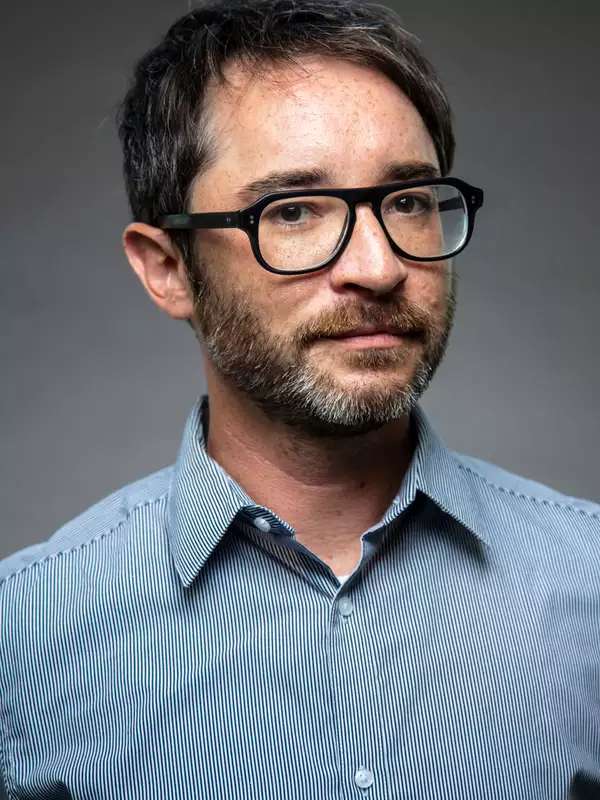
Nathan Gorelick
Department
English, First Year Foundation
Office
Office Hours
Contact
Nathan Gorelick teaches in the English Department and for the First-Year Experience program. His areas of expertise include British and Continental Literature from the Restoration through Romanticism, Enlightenment philosophy and ideology, literary theory, and clinical and critical psychoanalysis. Before joining the faculty at Barnard he was Associate Professor of English at Utah Valley University, where he also directed the summer Study Abroad Program in London and was the recipient of numerous grants and awards, including the Dean’s Scholarship Award and multiple grants for Engaged Learning in the Liberal Arts.
Professor Gorelick’s research takes place at the intersections of literature, psychoanalysis, and ideology critique. His first book, The Unwritten Enlightenment: Literature between Ideology and the Unconscious (Northwestern University Press, 2024), reveals how eighteenth-century literature, particularly the novel, avowedly or implicitly subverts, resists, or otherwise confounds the most powerful and enduring political and philosophical formations of its time. His next book, Semiotics of Ruination, examines the end of the world—a literary theme, philosophical problem, and lived material reality—from trans-Atlantic slavery and the origins of modern colonialism to the increasingly catastrophized present. A third, long-term research project considers the history of the relation between psychedelic drugs and the Freudian field, as well as how this relation may be reinvented today. He has also published academic articles and book chapters on diverse topics including the psychology of ecological collapse, Continental philosophy, the Haitian Revolution, the unconscious foundations of Islamophobia, and contemporary Islamicate politics. And he is the editor of Provocations Journal, the companion publication to the Provocations book series from University of Nebraska Press.
He has completed the six-year cycle of the Training Seminar in Lacanian Psychoanalysis with Gifric in Quebec City, Canada, and he is a Candidate in the Licensed Psychoanalysis Certificate Program at the Pulsion Institute. He is a member of the Executive Council for the Modern Language Association's Forum on Psychology, Psychoanalysis, and Literature.
- Ph.D., M.A., Comparative Literature, State University of New York at Buffalo
- B.A., New York University
- Literary Criticism and Theory
- Eighteenth-Century Studies
- Psychoanalysis
- Colonialism and Anti-Colonialism
- Continental philosophy
- The Unwritten Enlightenment: Literature between Ideology and the Unconscious (Evanston: Northwestern University Press, 2024).
- "Psychoanalysis on Drugs." Parapraxis Magazine, Issue 3 (2024), 132-153.
- “‘Epistème la gris’: Foucault and Psychedelic Neoliberalism.” Continental Thought and Theory. Vol. 4, issue 1 (2022), 230-259.
- “Psychoanalysis at the End of the World.” In Lacan and the Environment, ed. Paul Kingsbury and Clint Burnham (New York: Palgrave, 2021), 221-237.
- “Why Sex is Special: Psychoanalysis Against New Materialism.” In Subject Lessons: Hegel, Lacan, and the Future of Materialism, ed. Russell Sbriglia and Slavoj Žižek (Evanston: Northwestern University Press, 2020), 171-189.
- “The Fetish, the Phallus, the Fantasy: Orientalism, Symbolic Castration, and the Eighteenth-Century Imaginary.” In Castration, Impotence, and Emasculation in the Long Eighteenth Century, ed. Anne Greenfield (London: Routledge, 2020), 69-87.
- “What is the Novel? The Fundamental Concepts of a Literary Phenomenon.” Continental Thought and Theory, Vol. 2, issue 3 (2019), 134-166.
- “Becoming Revolution: From Symptom to Act in the 2011 Arab Uprisings.” Islamic Psychoanalysis and Psychoanalytic Islam, ed. Ian Parker and Sabah Siddiqui (London: Routledge, 2019), 88-101.
- “The Real (of) Debt: Notes Toward an Ethics of Trash.” Continental Thought and Theory, Vol. 1, issue 2 (2017), 490-517.
- “Translating the Islamicate Symptom.” SCTIW Review: Journal of the Society for Contemporary Thought and the Islamicate World (June 2015), 1-13
- “Extimate Revolt: Mesmerism, Haiti, and the Origin of Psychoanalysis.” CR: New Centennial Review, Vol. 13, no. 3 (Winter 2013), 115-138.
- “Life in Excess: Insurrection and Expenditure in Antonin Artaud’s Theater of Cruelty.” Discourse, Vol. 33, no. 2 (2011), 263-279.
- “Fethi Benslama and the Translation of the Impossible in Islam and Psychoanalysis.” Umbr(a): A Journal of the Unconscious, “Islam” issue (2009), 188-192.
- “Imagining Extraordinary Renditions: Terror, Torture and the Possibility of an Excessive Ethics in Literature.” Theory & Event, Vol. 11, no. 2 (2008), online: 7,700 words.
-
"The Unwritten Enlightenment." New Books in the Arts and Sciences at the Heyman Center for the Humanities, Columbia University, October, 2024.
-
“Shamanalysis.” Center for the Study of Psychoanalysis and Culture, State University of New York at Buffalo, April, 2024.
-
“Love Drugs and Libido.” Unconscious Berlin, Galerie Olga Benario, Berlin, Germany, July, 2023.
- “Psychoanalysis on Drugs.” Department of Comparative Literature at Cornell University, April 2022.
- “Heidegger and Lacan: The Missed Encounter.” Psychoanalysis Reading Group at Cornell University, April 2022.
- “The Subject of Revolution: A Lacanian Provocation.” Black Box Speaker Series for the Program in Culture and Theory at the University of California, Irvine, April 2021.
- “Reading the Twang of the Void.” Psychoanalysis and Psychedelics Speaker Series for the Maudsley Psychedelic Society at King’s College, London, February 2021.
- “What is Called Revolution.” Department of Philosophy at California State University, Chico, November 2019.
- “Islam, Psychoanalysis, Revolution.” Mahindra Humanities Center at Harvard University, February 2017.